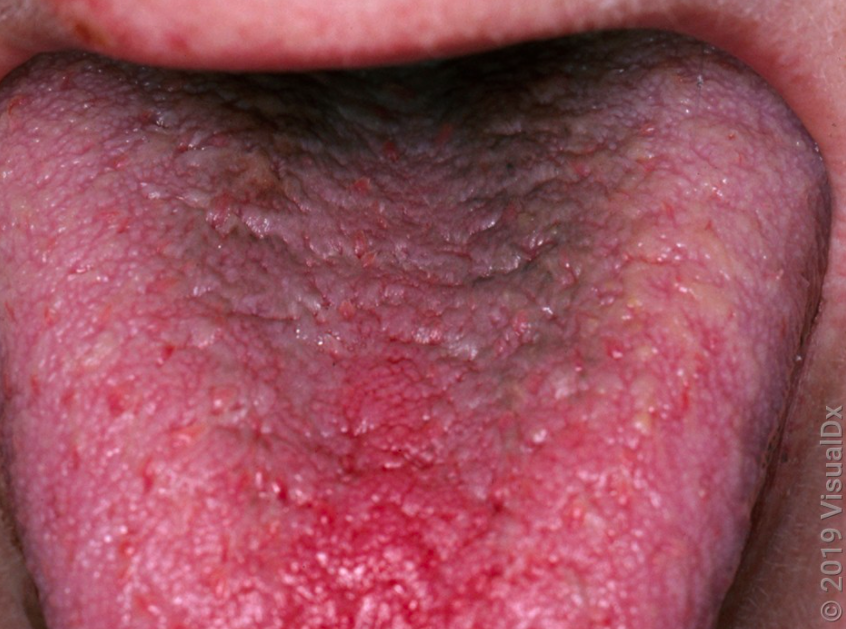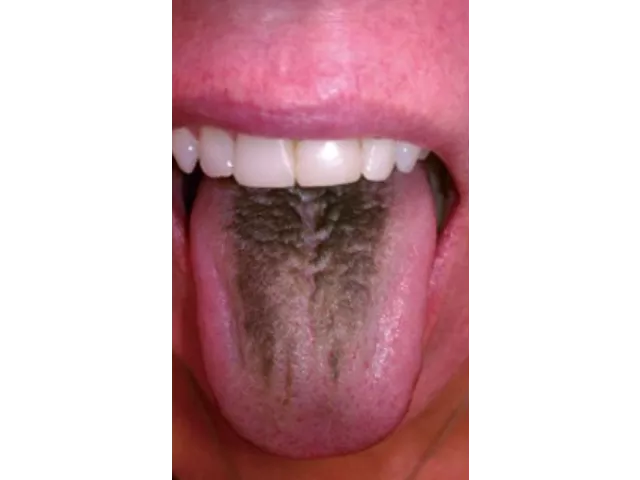Black hairy tongue
OVERVIEW
What is black hairy tongue?
Black hairy tongue, also known as "hairy tongue" or "black tongue coating," is a benign tongue condition. Its main characteristic is the elongation and darkening of structures on the tongue called "filiform papillae," which appear as raised, darkened, or blackened projections.
Black hairy tongue is essentially the accumulation of dead skin cells from filiform papillae that fail to shed properly. Combined with the attachment of external substances—such as bacteria, fungi, tobacco, food particles, and other debris—the appearance becomes more pronounced, and the color changes, resulting in visible hair-like protrusions.
It's important to note that this condition does not indicate any underlying serious illness, so there's no need for excessive concern.
SYMPTOMS
What are the symptoms of black hairy tongue?
Black hairy tongue typically appears on the surface of the tongue, initially at the back and then spreads forward and to the sides (see Figures 1 and 2 below).

Figure 1, Source: visualdx

Figure 2, Source: https://www.ncbi.nlm.nih.gov/pmc/articles/PMC4138463/
Additionally, due to the following factors, the color of black hairy tongue may not always be black but can also appear yellow, brown, tan, green, or even white:
- Filiform papillae may be stained by different foreign substances;
- The degree of papillae hyperplasia varies;
- The amount of pigment differs.
Black hairy tongue usually does not cause discomfort or pain. In rare cases, mild symptoms like bad breath, unusual taste (including metallic taste), nausea, or slight itching may occur.
The duration of black hairy tongue varies. Some cases resolve on their own over time, while others may persist for months or longer.
Who is more likely to develop black hairy tongue?
Black hairy tongue is relatively common overall, with reported prevalence rates ranging from 0.5% to 11.3% in different populations.
While it can occur at any age, it is more common in adults.
Certain groups are also more susceptible, such as the elderly, cancer patients, smokers, long-term tea drinkers, those with poor oral hygiene, and individuals with reduced tongue movement or chewing function.
Gender-wise, men are about three times more likely to develop black hairy tongue than women, possibly due to higher smoking rates and poorer oral hygiene habits among males.
CAUSES
What causes black hairy tongue?
Black hairy tongue may be related to many factors, and the specific causes vary from person to person.
Overall, contributing factors include:
- Poor oral hygiene, smoking, dry mouth/reduced saliva/dehydration;
- Use of antibiotics (e.g., erythromycin, doxycycline), bacterial infections, Candida infections;
- Frequent use of irritating products (e.g., mouthwashes containing hydrogen peroxide, witch hazel, or menthol);
- Excessive tea or coffee consumption, heavy alcohol intake, eating overly soft foods (which fail to help remove dead skin cells from the tongue).
Is black hairy tongue contagious?
No.
Although black hairy tongue is associated with overgrowth of pigment-producing fungi in the mouth, these are opportunistic pathogens that cause disease only when the normal oral microbiota is disrupted. Contact with such fungi in a healthy oral environment will not lead to the condition.
DIAGNOSIS
How is black hairy tongue diagnosed?
Black hairy tongue can be clinically diagnosed based on typical color changes.
What are the microscopic features of black hairy tongue?
Microscopic examination reveals significant hyperkeratosis accumulation at the tips of normal filiform papillae, with common bacterial colonization on the surface.
What diseases should black hairy tongue be differentiated from?
Black hairy tongue should be clinically and histologically differentiated from oral hairy leukoplakia. The latter occurs in HIV-infected patients. Hairy leukoplakia typically appears on the lateral sides of the tongue, initially as wrinkled patches that later develop into adherent white plaques.
Microscopic examination may show acanthosis, hyperkeratosis, irregular small spiky projections of keratin, vacuolated keratinocytes, and the presence of Epstein-Barr virus within the vacuolated keratinocytes.
TREATMENT
What department should I see for black hairy tongue?
You can visit a dentist or dermatologist at the hospital.
Does black hairy tongue require treatment?
Treatment is recommended.
However, black hairy tongue is a benign condition, and the key to treatment is proper preventive measures. Specific recommendations include:
-
Try to identify the cause and avoid it: For example, quit smoking and avoid overusing antibiotics.
-
Maintain good oral hygiene.
- Brush your teeth after meals, at least twice a day;
- Clean your tongue (using a soft-bristled toothbrush or tongue scraper) to gently remove dead cells, bacteria, and food debris;
- Use dental floss once daily to remove food particles and plaque between teeth;
- If possible, visit a dentist regularly for oral hygiene checkups.
-
Maintain good nutrition, drink plenty of water, and eat a balanced diet, including fruits, vegetables, and whole grains.
-
If there is a bacterial or fungal (e.g., Candida) infection, use anti-infective medications under a doctor's guidance.
If you are unsure whether it is black hairy tongue, consult a professional doctor for an accurate diagnosis to avoid misdiagnosis. You can visit a dentist or dermatologist at the hospital.
DIET & LIFESTYLE
What should be noted in the diet for black hairy tongue?
There are no specific dietary restrictions. A healthy and balanced diet is sufficient.
-
When cooking, use less salt, less oil, and fewer high-salt seasonings. Avoid pickled vegetables, cured meats, etc.;
-
Do not rely solely on refined rice and white flour for staple foods. Replace some with whole grains, legumes, potatoes, pumpkins, etc.;
-
Balance meat and vegetables. Prioritize white meats like chicken, duck, and fish, and limit fatty meats. Eggs and milk are important sources of protein and other nutrients;
-
For vegetarians, consume more beans and bean products to supplement protein;
-
Eat plenty of fruits and vegetables;
-
Avoid alcohol as much as possible.
What should be noted in daily life for black hairy tongue?
There are no special lifestyle precautions. Maintain a healthy lifestyle.
Do not smoke;
Exercise regularly, avoid prolonged sitting, and prevent overweight or obesity. Aim for 3–5 exercise sessions per week, about 30 minutes each, combining aerobic and strength training at a moderate intensity without overexertion;
Ensure sufficient sleep daily, whether going to bed early or late;
Learn to manage stress and emotional tension.
PREVENTION
How to Prevent Black Hairy Tongue?
-
Do not smoke;
-
Use antibiotics and oxidizing mouthwashes rationally;
-
Maintain strict oral hygiene, brush teeth morning and night;
-
Clean the mouth, teeth, and gums of infants as well;